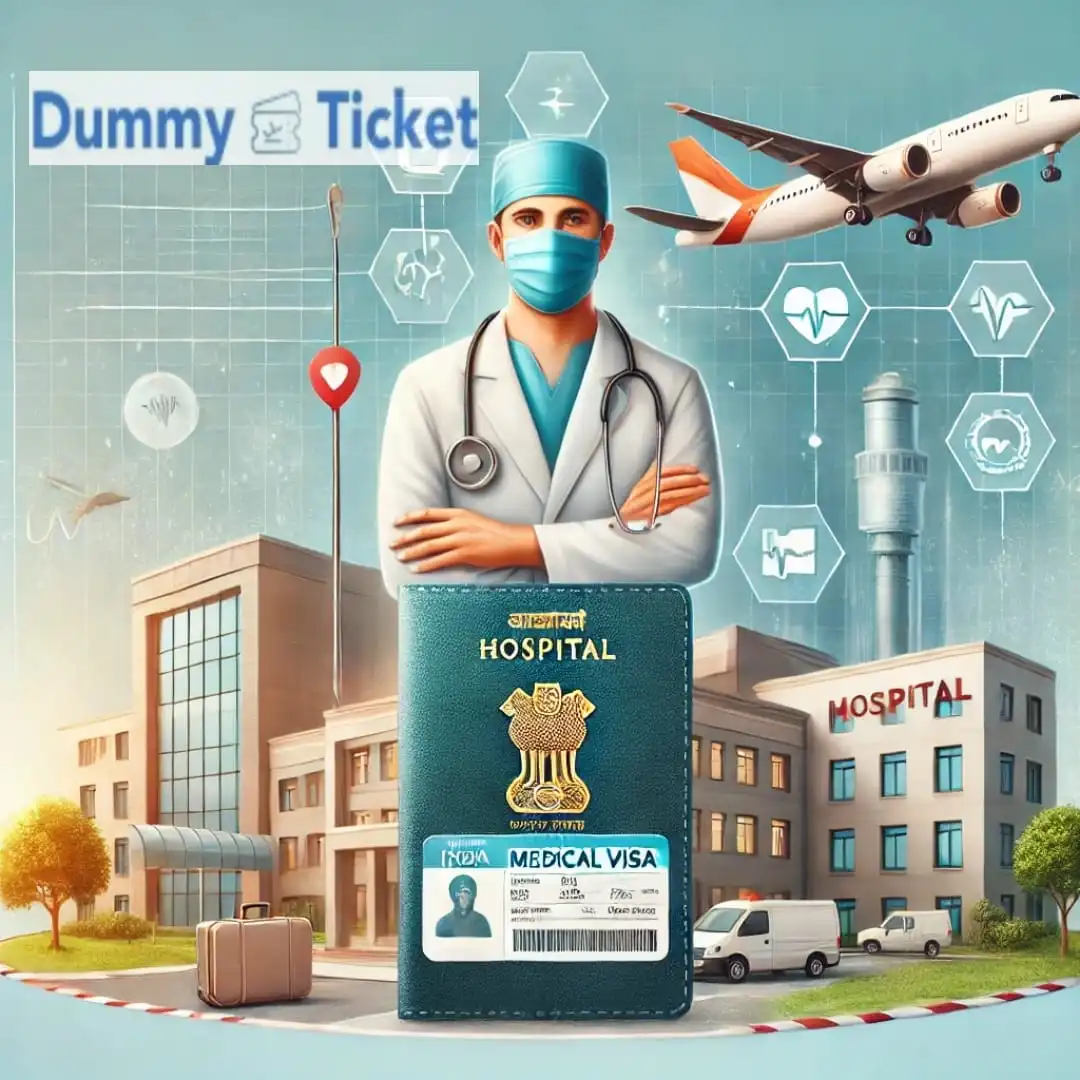The Indian visa is one of the most sought-after permits by travelers for various purposes such as tourism, business, studies, and medical treatment. The Indian government offers a range of options to meet the needs of foreign visitors, with flexible and straightforward procedures in most cases. Here is a detailed guide on the types of Indian visas, their requirements, and the application process:
Types of Indian Visas
1. Tourist Visa:
- Designed for visitors wishing to travel to India for tourism or visiting friends and family.
- Validity: Ranges from one month to five years.
- Entry Options: Single or multiple entries.
2. Business Visa:
- Issued to individuals visiting India for business purposes, such as attending meetings or conferences.
- Validity: Typically up to five years with multiple entries.
3. Employment Visa:
- Granted to employees wishing to work for an Indian company or organization.
- Validity: One year, extendable.
4. Student Visa:
- Issued to students who have been accepted into recognized Indian educational institutions.
- Validity: Corresponds to the duration of the study program.
5. Medical Visa:
- Designed for patients seeking medical treatment in India.
- Validity: Generally allows multiple entries for up to one year.
6. Transit Visa:
- For travelers passing through India en route to another destination.
- Validity: Very short, usually 72 hours.
Requirements for Applying for an Indian Visa
Documents required to obtain an India visa
- Visa Application Form: To be completed online via the Indian embassy or consulate website.
- Passport: Must be valid for at least six months.
Should have at least two blank pages. - Recent Photograph: White background, size 2 x 2 inches.
- Dummy Flight Ticket: Confirmed return or onward journey tickets.
- Proof of Accommodation: Hotel bookings or an invitation letter from a local host.
- Financial Proof: Bank statement showing sufficient funds to cover the stay.
- Visa Fees: Vary depending on the type and nationality.
Additional Requirements Based on Visa Type:
- Business Visa: Invitation letter from the Indian company and a copy of the company’s registration.
- Student Visa: Admission letter from the Indian university.
- Medical Visa: Medical reports and an acceptance letter from the Indian hospital.
How to Apply for an Indian Visa
1. Electronic Visa (e-Visa) Application:
India offers an e-Visa system for eligible travelers, enabling them to apply online:
- Visit the Indian e-Visa website.
- Fill out the application form and upload the required documents.
- Pay the fees online.
- Receive the visa via email.
2. Embassy or Consulate Application:
For those not eligible for an e-Visa, applications can be submitted in person at the nearest Indian embassy or consulate.
Visa Processing Time
- e-Visa: Typically issued within 3-5 business days.
- Regular Visa: Processing can take 7-15 business days, depending on the type of visa.
Indian Visa Fees
- The cost of an Indian visa varies based on nationality and type.
- Short-Term e-Visa: Starts at $10 USD.
- Long-Term Visas: Can cost $100 USD or more.
Important Notes
- Always verify the latest regulations with the Indian embassy, as rules are subject to change.
- Ensure all submitted information matches your passport details to avoid rejection.
- Use the visa strictly for its intended purpose, as misuse can lead to penalties.
We talked before in previous articles about the Indian tourist visa and the work visa in India. If you are interested, it is recommended to read these articles as well.
India Medical Visa: Comprehensive Guide for Receiving Treatment in India
India is one of the top global destinations for medical treatment due to its advanced technology, highly qualified medical staff, and affordable healthcare costs compared to other countries. Millions of patients from around the world are attracted to India for exceptional quality treatment at competitive prices. To access healthcare in India, obtaining a Medical Visa is essential. This article provides a detailed guide covering everything you need to know about the Indian Medical Visa, including procedures, requirements, costs, and the benefits of medical treatment in India.
India's Significance as a Global Medical Hub
India ranks as a leading destination for medical tourism due to several advantages:
- Affordable Costs with High Quality:
India offers world-class medical services comparable to top global hospitals at significantly lower costs. - Advanced Technology:
Hospitals in India are equipped with cutting-edge medical devices and state-of-the-art surgical technologies. - Expert Physicians:
India boasts a team of internationally experienced doctors and surgeons. - Minimal Waiting Times:
Immediate and quick appointments are provided to international patients, eliminating long waiting periods. - Diverse Specializations:
India provides comprehensive treatment in various fields, including cardiology, oncology, orthopedics, organ transplantation, and chronic disease management.
What is the Indian Medical Visa?
The Indian Medical Visa is a special permit granted to foreign patients requiring treatment at accredited Indian hospitals. This visa is strictly for medical purposes and is distinct from other visas, such as tourist or business visas.
Requirements for Obtaining an Indian Medical Visa
Documents required for India medical visa
- Passport:
Must be valid for at least six months.
Should have at least two blank pages. - Visa Application Form:
To be completed online via the Indian embassy website or the e-Visa system. - Photographs:
A colored photo with a white background.
Size: 2x2 inches. - Detailed Medical Report:
A recent report outlining the patient’s health condition.
A recommendation from a local doctor or hospital for treatment in India. - Acceptance Letter from an Indian Hospital:
An official letter from an accredited Indian hospital confirming the patient’s acceptance for treatment.
The letter should include treatment details and estimated costs. - Proof of Financial Support:
A bank statement demonstrating sufficient funds to cover treatment and accommodation expenses in India. - Travel Tickets:
Confirmed round-trip flight tickets. - Accommodation Proof:
Hotel reservations or other accommodation details for the treatment period.
Steps to Apply for an Indian Medical Visa
- Online Application (e-Medical Visa):
India offers a convenient electronic visa for medical purposes:
- Visit the Indian e-Visa website.
- Select the "e-Medical Visa" category.
- Complete the application form and upload the required documents.
- Pay the visa fees online.
- Embassy Application:
- Visit the nearest Indian embassy or consulate.
- Submit your application in person with the necessary documents.
- Pay the fees and receive a receipt.
- Processing Time:
- e-Visa: Issued within 3-5 business days.
- Regular Visa: May take 7-15 business days.
Validity of the Indian Medical Visa
- Duration: Typically valid for up to six months, with the possibility of extension in some cases.
- Number of Entries: Usually issued as a multiple-entry visa to facilitate follow-up visits.
Cost of the Indian Medical Visa
The visa fees vary depending on the applicant's nationality and visa type:
- e-Medical Visa: Ranges from $80 to $100 USD.
- Regular Visa: Typically costs between $100 and $150 USD.
Benefits of Treatment in India for Medical Visa Holders
- Dedicated Services for International Patients:
Indian hospitals provide tailored services for foreign patients, including interpreters and transportation assistance. - Accessible Medication:
Medicines are available at affordable prices and high quality. - Comprehensive Care:
Includes physiotherapy sessions, psychological support, and nutritional plans.
Top Hospitals in India for Medical Treatment
- Apollo Hospitals:
Renowned for cardiac surgeries, liver transplants, and cancer treatment. - Fortis Hospitals:
Famous for organ transplantation and cosmetic surgery. - Max Healthcare:
Specializes in neurology, oncology, and orthopedics. - Narayana Health:
Known for cardiovascular treatments. - Manipal Hospitals:
Recognized for chronic disease management and kidney transplants.
Procedures After Arriving in India
- Registration with Immigration:
Medical visa holders must register with the Foreigners Regional Registration Office (FRRO) within 14 days of arrival. - Hospital Visit:
Proceed directly to the contracted hospital to initiate treatment. - Visa Extension:
If an extension is needed, apply through the FRRO with additional documentation.
With its state-of-the-art medical infrastructure, expert healthcare professionals, and affordable treatment costs, India continues to be a preferred destination for medical tourism. By securing a Medical Visa, international patients can access world-class treatment tailored to their specific needs.
Important Tips for Obtaining an Indian Medical Visa
- Ensure that you submit accurate and complete documents to avoid rejection of your application.
- Verify the list of government-approved hospitals in India before applying.
- Keep both electronic and hard copies of the visa and all documents while traveling.
- Stay in contact with the Indian embassy for updates on the latest procedures.
Frequently Asked Questions About the Indian Medical Visa
- Can family members accompany the patient?
Yes, family members can accompany the patient with a "Medical Attendant Visa." - Can the Indian Medical Visa be extended?
Yes, it can be extended in critical medical cases based on the hospital's recommendation. - Does the medical visa cover all types of treatment?
The medical visa covers both surgical and non-surgical treatments, but the treatment must be documented and approved by the Indian hospital.
The Indian Medical Visa offers tremendous opportunities for patients from all over the world to receive top-quality treatments at competitive prices. By following the guidelines and requirements outlined above, you can simplify the visa process and take advantage of India's advanced medical services.
The Importance of Treatment in India: Why India is a Global Medical Destination
India has become one of the most preferred destinations in the world for medical tourism, attracting millions of patients from around the globe due to its excellence in healthcare. The combination of high quality, affordable costs, and technological advancements makes India a standout choice for those seeking effective and quick treatment. In this article, we highlight the key reasons why treatment in India is a popular option for many.
1. Affordable Costs with High Quality
- Competitive Prices:
Treatment costs in India are up to 50-70% lower than in Western countries such as the United States and Europe. - World-Class Quality:
Despite the lower costs, Indian hospitals offer medical services that rival top global hospitals.
2. Globally Qualified Medical Staff
India is home to highly skilled and experienced doctors.
Many Indian doctors and surgeons have trained or worked in prestigious hospitals in Europe and the United States.
Medical and nursing staff are trained to deal with international patients professionally.
3. State-of-the-Art Medical Technology
Indian hospitals are equipped with the latest medical devices used in diagnosis and treatment.
Technologies used include:
- Robotic surgery
- Organ transplantation
- Advanced radiation oncology
4. Short Waiting Times
One of the most notable advantages of receiving treatment in India is the speed of medical services. You can get an appointment for surgery or treatment within a few days or weeks, compared to long waiting times in other countries.
5. Wide Range of Available Medical Specialties
India offers a broad spectrum of medical and surgical treatments in various specialties, including:
- Open-heart surgery and heart transplants
- Kidney and liver transplants
- Cancer treatment with the latest techniques
- Spinal surgery
- Fertility treatments and IVF
6. Customized Services for International Patients
- Indian hospitals provide specialized services for international patients:
- Interpreters to facilitate communication with doctors and medical staff
- Airport-to-hospital transportation services
- Accommodation for patients and their families
- Post-treatment follow-up to ensure complete recovery
7. Opportunity to Combine Treatment and Tourism
India is a great destination to experience new cultures and explore stunning tourist attractions, making medical treatment more enjoyable.
Famous cities like New Delhi, Mumbai, Bangalore, and Chennai host world-class hospitals alongside attractive tourist destinations.
8. International Recognition of Indian Hospitals
Many Indian hospitals are internationally accredited, including by bodies like JCI (Joint Commission International) and NABH, which enhances trust in the hospitals' quality and safety standards.
9. Ease of Visa Procedures
India offers great convenience for international patients with the Medical Visa.
The visa is available online (e-Medical Visa), with a fast processing time and low costs.
10. Integrated Care Programs
India provides comprehensive care, including:
- Physiotherapy services
- Rehabilitation programs
- Psychological and social support for patients
11. Alternative Medicine Treatments
In addition to traditional treatments, India is renowned for offering alternative medicine therapies such as:
- Ayurveda: An ancient Indian medical system focused on the balance between mind and body.
- Yoga and physical therapy: To relieve pain and improve mental and physical health.
- Acupuncture and natural treatments.
12. Cultural Diversity and Easy Adaptation
India is culturally and linguistically diverse, making international patients feel comfortable.
Most doctors and medical staff speak fluent English, making communication easy for foreign patients.
13. Follow-Up Programs for International Patients
Indian hospitals offer regular follow-up programs via online or phone consultations to ensure continuity of treatment and full recovery.
Examples of Successful Treatments in India
- A successful heart transplant for a young child from an African country at Fortis Hospital.
- Treatment of complex tumors using advanced radiation technologies at Apollo Hospitals.
- Successful liver transplants for patients from the Middle East and North Africa.
India stands out as one of the best medical destinations in the world, offering a combination of affordable costs, high-quality care, and advanced technology. Whether you are seeking complex surgical procedures or comprehensive medical care, India provides everything needed for a successful and fulfilling treatment experience.
The Connection Between Dummy Flight Ticket and Traveling to India for Medical Treatment
When planning to travel to India for medical treatment, securing a Dummy flight Ticket is a crucial step in completing the necessary travel arrangements, including obtaining a medical visa and organizing your trip. Below is an explanation of the relationship between Dummy flight Tickets and their importance for international patients traveling to India for treatment.
- Medical Visa Requirements
To apply for an Indian medical visa, embassies and consulates typically require proof of a round-trip flight reservation.
Dummy Ticket provides assurance to the embassy that the patient has the intention of returning after the completion of treatment, which enhances the chance of the visa application being approved. - Planning the Treatment Journey
Traveling for treatment involves precise coordination with the hospital and arrival schedules. A temporary booking allows patients to plan their journey effectively.
Dummy Tickets are easily adjustable if treatment dates or patient needs change. - Cost and Flexibility
Dummy flight Tickets are often less expensive than purchasing final tickets.
They help patients avoid high costs associated with emergency changes to flight schedules due to medical delays or visa processing issues. - Proof of Serious Intent
When communicating with Indian hospitals to receive a treatment plan, presenting a Dummy flight Ticket demonstrates the patient’s commitment to traveling for treatment. This often encourages the hospital to prioritize services. - Dealing with Emergency Cases
In urgent medical situations, a Dummy flight Ticket can expedite visa processing or submission of required documents to the hospital without waiting for the final ticket.
A Dummy flight Ticket plays a pivotal role in facilitating travel arrangements for medical treatment in India. It is not only a key requirement for obtaining a medical visa but also helps patients organize a well-planned and flexible treatment journey. This provides peace of mind and ensures a smooth and successful medical experience.




